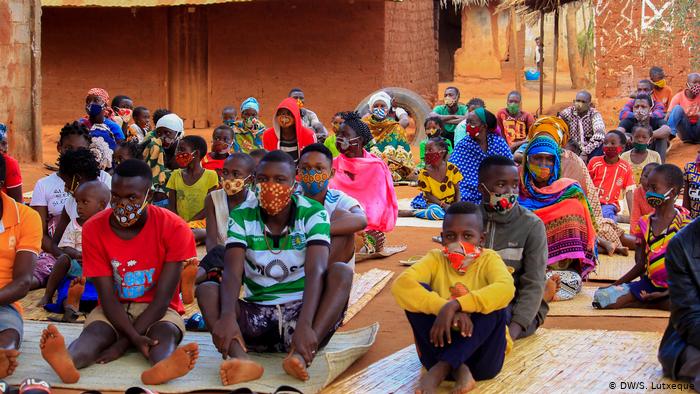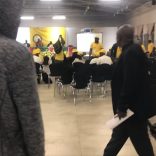Mozambique: Latest terror attacks displace 12,000 people - AIM | Watch
IDPS in Cabo Delgado: “The situation is not as it appears on social media” – Ngunga

FiILE - IDPs from Cabo Delgado. [File photo: DW]
The Secretary of State for Cabo Delgado, Armindo Ngunga, recognises that there are challenges in assisting displaced people arriving in Pemba in their flight from terrorism, but says everything is under control.
According to official figures, about 11,200 internally displaced people (IDPs) have arrived in Pemba, the capital of Cabo Delgado, since October 16, and the authorities warn that space to accommodate is running out.
It is estimated that, in all, around 435,000 people have moved within Mozambique in search of safety since the insurgent attacks began in Cabo Delgado in October 2017. With the resurgence of the attacks, Pemba has received an unprecedented number of IDPs.
The Provincial Secretary of State for Cabo Delgado, Armindo Ngunga, says that the authorities are managing the arrival of these people well, and that “the situation is not as it appears on social media”.
DW Africa: Is Pemba bursting at the seams with this new wave of refugees?
Armindo Ngunga (AN): Yes, it is. In less than a year, Pemba has 150% of its normal population. In 2017, Pemba had 224,000 inhabitants, if I’m not mistaken, and yesterday the mayor of Pemba told me that there are about 105,000 displaced people. That’s a 50% growth of the population in one year, and that is a lot for a city, in all aspects. It puts pressure on basic services – water, sanitation, everything.
DW Africa: So, is there a risk that the system will collapse?
AN: No, it will not collapse because we have a management committee, we are creating new villages, resettlement centres, we are creating infrastructure on the land, we are parcelling out the land, we are creating conditions for water, sanitation, etc. Soon people will move, so, no, it will not collapse.
DW Africa: And what assistance has been given to displaced people in the context of Covid-19?
AN: It is a challenge. We have already had difficult times here in Pemba. The city was declared a community transmission site in June, when it peaked. But after that, work was carried out, the epidemiological survey was carried out, and today we have a recovery rate that varies between 80 to 93%. We have had some bad cases. Although I have been saying that Pemba is the safest place in terms of Covid-19, we have not closed the door. We continue to receive people from Maputo, Nampula and other provinces. And we do not require people to test on departure or on arrival. So, from time to time someone brings Covid-19. We are managing the situation, we are no longer alarmed.
DW Africa: What have been the challenges in assisting displaced people arriving by sea?
AN: We set up a kind of clinic there at the point of arrival; we set up a kitchen, there are activists who have humanitarian residences, our health personnel are there. When people arrive, they are received. Depending on their health status, an ambulance is parked there, they enter it. If a woman is in the last days of pregnancy, [she is also immediately assisted]. When someone is debilitated, hungry or tired, he/she receives a basic meal, a porridge with sugar that helps them recover a little. We are managing [well]; the situation is not what appears on social networks, the situation is completely under control.
DW Africa: A shipwreck recently occurred in which more than 42 people died. Is it confirmed that the passengers were internally displaced?
AN: Yes, it was. We haven’t yet conducted an inquiry, but that boat was part of the group that brings people to Pemba. About 15 to 20 [such boats] arrive every day.
DW Africa: Are the authorities in control of the situation on the islands from which the people are leaving?
AN: These people are not native to the islands, they are natives of the coastal area who, because of the terrorism, took refuge on the islands. But on the islands there are no conditions for [so many people] at the same time. So from there, they go to places where there are conditions.
DW Africa: On Mocímboa da Praia, the First Commission of the Assembly of the Republic prepared a report in which it says that the village is still in the hands of terrorists. Do you confirm that the situation is still not amenable to the State?
AN: Terrorists have been damaging some district headquarters since March. The district government is operating outside the district. With so much destruction, it is not possible to live there, or work in an office. So, people have got out of the district. Some people remain, but people are not working at the district headquarters [capital], as such.












Leave a Reply
Be the First to Comment!
You must be logged in to post a comment.
You must be logged in to post a comment.